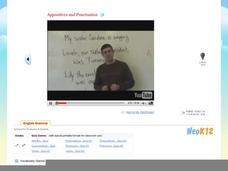Curated OER
Neon The Fish
Neon the Fish is not invited to the party in the dark cave because he is not big like the other sea creatures attending. He feels rejected and different. But when the big fish get scared in the dark cave, Neon comes in, and gives off...
Curated OER
The Truth about Apostrophes
Look at ownership (possession) with Yossarian the Grammarian regarding apostrophes. Singular and plural nouns are covered.
Curated OER
The Preposition and Prepositional Phrase
Clarify what a preposition truly is. Prepositions come before some noun (object of the preposition) and together with that noun, to make prepositional phrases. The phrases work as adjectives or adverbs, more like a single word. Yossarian...
Curated OER
Public Speaking Tip for Kids - Eye Contact While Speaking
You want to make eye contact when speaking; not scanning so much, but randomly looking at various people. Your audience will feel a connection when eye contact is made. A British speaker demonstrates as he speaks to the camera.
Curated OER
Appositives and Punctuation
Appositives rename nominal phrases that they are next to. These are two equal nouns. Yossarian the Grammarian gives several examples on his whiteboard as he continues to talk about restrictive and non-restrictive phrases as well.
Curated OER
Phonics Song - 1 - The Basics
An object pops up on the screen for each letter of the alphabet, accompanied by the letter itself and the name of the object. The objects are drawn in black and white and the letters pop up in red.
Curated OER
Public Speaking Tip for Kids - Opening Your Speech
According to this speaker, you have ten seconds to grab your audience's attention. Quotes, startling statistics, and audience participation all work great.
Curated OER
Kindergarten Sight Words
A collection of single-syllable sight words appropriate for kindergarteners flashes across a yellow screen. Each word is clearly read and is printed in dark black lettering.
ABCMouse
Big Bug and Little Bug
Impart the value of kindness and reinforce rhyming CVC words with a short video about a bug who offers help to another bug in need.
Curated OER
Dad Song
What does a dad do? Listen to this song to find out. In this song, dad plants veggies, plays basketball, reads books, and teaches his children to ride bikes. Ask your preschoolers what types of things their dads do.
Sesame Street
D: Dance
Dance starts with the letter “D!” Elmo, Big Bird, and Snuffy dance with the letter “D.” This is a parody of the old iPod commercial.
TED-Ed
Mysteries of Vernacular: Dynamite
Start class off with a bang! Check out this video, part of a series on word development, which tracks the meaning of the word dynamite back to the inventor of dynamite, Alfred Nobel. After perfecting his invention, Nobel created the word...
TED-Ed
Mysteries of Vernacular: Venom
Choose venom as the word of the day and demonstrate the word's origins with a quick video. The narrator draws parallels between venom and its predecessors, briefly explaining history along the way. Check out the additional materials for...
TED-Ed
Mysteries of Vernacular: Inaugurate
The United States inaugurates a president every four years, but where does the word inaugurate really come from? Watch the video to find out and then read a few famous inaugural addresses, which are linked in the Dig Deeper section on...
TED-Ed
Mysteries of Vernacular: Tuxedo
Would you have guessed that the word tuxedo comes from a Native American word? Viewers can learn about how words become anglicized and watch the development of tuxedo. An engaging tidbit to show to your class before a unit on the...
TED-Ed
Mysteries of Vernacular: Gorgeous
What does a wimple have to do with being gorgeous? Watch the video to find out! Learners can observe the development of word meaning over centuries in just two minutes' time. Fun for a warm-up or closing activity, the video is part of...
TED-Ed
Mysteries of Vernacular: X-Ray
What is they mystery behind the name of the x-ray? Find out in a brief informational video that tracks the etymology back to Descartes. Class members can watch the video and then interact with the additional resources. Flip the lesson to...
TED-Ed
Mysteries of Vernacular: Fizzle
Where do words come from? Watch this quick video to find out the origins of fizzle. The narrator mentions some amusing details about fizzle's past, describing a few changes in meaning that have happened over many years. Teach your class...
TED-Ed
Mysteries of Vernacular: Hearse
What do a wolf, a rake, and frame have in common? They are all part of the background of the word hearse. View the video for an explanation, and accompanying animation, of just how the word hearse came to be. Check out the additional...
TED-Ed
Mysteries of Vernacular: Jade
Where does the word jade come from? This video recounts the history of the stone itself as it tracks the development of the word through the centuries. Flip the lesson to add your own questions and information to extend the lesson. While...
TED-Ed
Mysteries of Vernacular: Quarantine
The word quarantine has origins in history that date back to the Black Death. The narrator explains how the current definition of the word quarantine came to be, with animation illustrating the concepts along the way. Useful for a...
TED-Ed
Mysteries of Vernacular: Miniature
Scribes once had to copy books by hand, and it was this process that birthed the word miniature. Watch as minium, or red lead used for pigment in ink, becomes miniature. The resource, part of a series of videos on vernacular, includes...
TED-Ed
Make Sense of Spelling
Help your pupils comprehend how words are put together. The video takes the history of words into consideration as the narrator investigates the word one and words related and connected to one. Using an onion as a metaphor, the video...
Curated OER
Sentence Improvement
Improve your sentences after watching this video. It explains the differences between 2A and DD sentences by showing different examples.
Other popular searches
- English Language Arts Exam
- English Language Arts Games
- Deaf English Language Arts
- English Language Arts Music
- English Language Arts Heroes
- English Language Arts Skills
- Language Arts English
- English Language Arts Grade 3
- English Language Arts Poetry
- English Language Arts Rating=3
- English Language Arts Unit Sc
- Language Arts or English

























